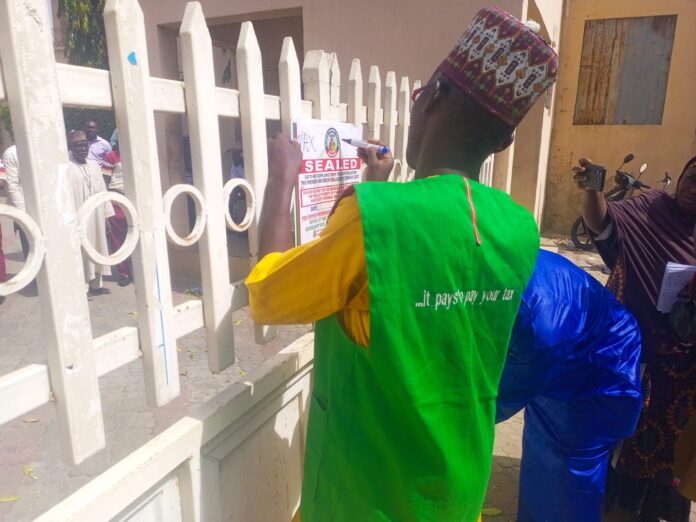The Kano State Board of Internal Revenue Service (KIRS) has sealed the head office of Max Air Limited in a dramatic move to enforce the payment of overdue taxes.
The company allegedly failed to remit over N190 million in Pay As You Earn (PAYE) and other liabilities from 2012 to 2017.
The move follows a series of attempts by the revenue service to contact the company, which reportedly ignored several correspondences sent by the tax agency.
Madam Ibrahim Abdullahi, the Director of Debt Management and Enforcement at KIRS, led the operation and explained that the sealing of Max Air’s office was in compliance with a court order obtained by the service.
“We obtained a court order to seal the head office of Max Air as part of our effort to enforce tax compliance,” Abdullahi said. “This is to ensure that companies fulfill their tax obligations as and when due.”
Max Air, one of Nigeria’s prominent national airline companies, is owned by Dahiru Barau Mangal, who is also linked to the New Nigeria People’s Party (NNPP) national leader, Senator Rabi’u Musa Kwankwaso. The ties between Mangal and Kwankwaso, a key political figure in Nigeria, have drawn attention to the case, fueling political discussions alongside the tax enforcement action.
Dantata and Sawoe Construction Also Sealed Over N241 Million Tax Default
The enforcement team also moved to seal the office of Dantata and Sawoe Construction Company, a major player in Nigeria’s construction industry, for failing to remit over N241 million in PAYE and withholding tax liabilities from 2021 to 2022.
“We took this measure after Dantata and Sawoe Construction Company failed to respond to our requests for payment,” Abdullahi explained. “We obtained a court order to seal their premises as well, and they will remain sealed until the tax liabilities are fully settled.”
In addition to Max Air and Dantata and Sawoe, the revenue service sealed the premises of Northern Rice and Oil Milling Nigeria Ltd, located at Gunduwawa Industrial Estate in Kano. This company also faced closure due to tax defaults.
Enforcement of Tax Compliance is Key to State Revenue
The Kano State government has long struggled to improve its internal revenue generation. The recent actions by the KIRS reflect an ongoing effort to collect taxes owed by major businesses and individuals, ensuring that they meet their civic duties and contribute to the state’s revenue.
Abdullahi stressed the importance of these enforcement actions, stating that such measures were essential for improving the financial standing of Kano State. “Our responsibility is to ensure that every taxpayer fulfills their obligations,” she said.
The tax authority’s aggressive stance has sent a clear message that no company, regardless of its size or political affiliations, is exempt from paying its due taxes. The agency is determined to pursue all tax defaulters, especially those who have been uncooperative in resolving their outstanding liabilities.
Political Implications and Backlash
Max Air’s connection to prominent political figures has raised questions about whether the tax enforcement action is purely administrative or politically motivated. Some critics suggest that the move could be linked to the political affiliations of the airline’s owner, Dahiru Mangal, whose connections to Kwankwaso have made headlines.
However, Abdullahi dismissed these concerns, stating that the action was purely based on the company’s failure to meet its tax obligations. “This is not about politics,” she said. “Our task is to ensure that the state collects the revenue it is entitled to, regardless of who owns the company.”
Ongoing Efforts to Boost State Revenue
KIRS officials have made it clear that the sealing of Max Air, Dantata and Sawoe Construction, and other companies is just the beginning. The agency intends to continue its crackdown on tax defaulters in a bid to increase revenue for Kano State.
“We will continue to carry out similar enforcement exercises to ensure that all taxes owed to the state are paid,” Abdullahi declared. “This is crucial to improving the revenue base of the state and ensuring that public services and infrastructure can be adequately funded.” Kano State, like many other Nigerian states, has faced significant challenges in generating revenue from sources other than federal allocations.

